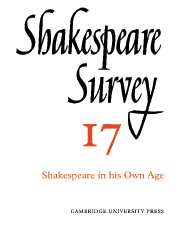Book contents
- Frontmatter
- THE DAILY LIFE
- 1 London and the Court
- 2 Provincial Life
- 3 Sailors and the Sea
- 4 Elizabethans and Foreigners
- 5 Education and Apprenticeship
- 6 The Law and the Lawyers
- 7 London’s Prisons
- PHILOSOPHY AND FANCY
- 8 The Commonwealth
- 9 Dissent and Satire
- 10 Scientific Thought
- 11 Medicine and Public Health
- 12 The Folds of Folklore
- 13 Symbols and Significances
- ART AND ENTERTAINMENT
- 14 Actors and Theatres
- 15 The Printing of Books
- 16 Music and Ballads
- 17 The Foundations of Elizabethan Language
- Notes
- Index
- Plate section
14 - Actors and Theatres
Published online by Cambridge University Press: 28 March 2007
- Frontmatter
- THE DAILY LIFE
- 1 London and the Court
- 2 Provincial Life
- 3 Sailors and the Sea
- 4 Elizabethans and Foreigners
- 5 Education and Apprenticeship
- 6 The Law and the Lawyers
- 7 London’s Prisons
- PHILOSOPHY AND FANCY
- 8 The Commonwealth
- 9 Dissent and Satire
- 10 Scientific Thought
- 11 Medicine and Public Health
- 12 The Folds of Folklore
- 13 Symbols and Significances
- ART AND ENTERTAINMENT
- 14 Actors and Theatres
- 15 The Printing of Books
- 16 Music and Ballads
- 17 The Foundations of Elizabethan Language
- Notes
- Index
- Plate section
Summary
'Players that offer service'
Acting is an ephemeral art. A great actor can enrich his patrons with an unforgettable experience but it is a matter of luck if they include a Hazlitt or a Lewes or a Beerbohm capable of resurrecting the experience through the power of the written word and carrying it living into the minds and hearts of later generations. No writers of this kind emerged during the age of Shakespeare; how Burbage played Hamlet is almost as conjectural as what song the sirens sang. But though we lack detailed word-pictures of the great performances of the period, the scholarly excavations of the last fifty years have brought to light numerous fragments of evidence about the various troupes of actors and it is now possible to piece some of them into mosaics which provide an outline of some of their histrionic styles and methods of casting. Some parts of these mosaics have rough edges and contrasting colours, but they coalesce sufficiently to permit some generalizations and to show that Shakespeare's references to acting exhibit a fuller awareness of the various histrionic traditions at work during his lifetime than those of any of his contemporaries.
During Shakespeare's lifetime, medieval miracle plays were still being performed in certain parts of England, notably at Chester, Norwich, Coventry, York and Perranzabulo. Most Elizabethan allusions to the acting of these plays are disparaging, and Shakespeare's most important reference to the subject is no exception and may have been prompted by first-hand knowledge. To Hamlet the ranting of the periwig-pated actor who tears a passion to tatters 'out-herods Herod'. This comparison may derive from Shakespeare's having seen the role of Herod acted at Coventry in the pageant of the Shearmen and Tailors during his boyhood or his 'teens. The Coventry miracles, as E. K. Chambers has noted, 'were played regularly, except in 1575, until 1580', and were 'probably the most famous in England'. Roscoe E. Parker's comparison of the Herods of the Coventry, York, Towneley, Chester, and Ludus Coventriae plays has revealed that the Coventry one far surpasses the others in rodomontade and furious action.
- Type
- Chapter
- Information
- Shakespeare Survey , pp. 189 - 204Publisher: Cambridge University PressPrint publication year: 1964



